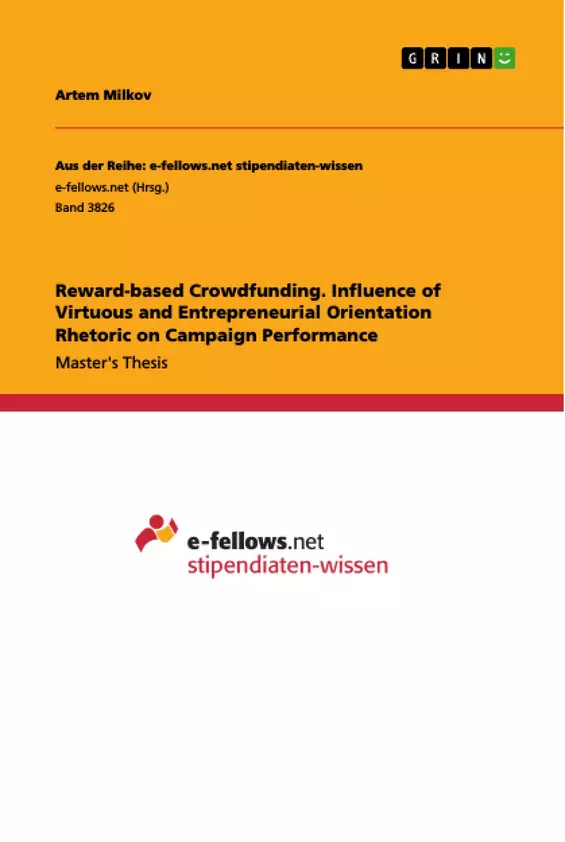This paper extends academic literature on reward-based crowdfunding and examines the influence of entrepreneurial rhetoric on campaign performance through the lens of the social role theory. It explores how altruistic values shared by its participants redefine the social role of an entrepreneur. It demonstrates how this peculiarity can be exploited in favour of various disadvantaged demographic groups through an appropriate use of the language reflective of virtuous and entrepreneurial orientations.
Despite their apparent importance, these two types of rhetoric have been largely neglected by scholars studying online funding platforms. Based on a quantitative analysis of 8,459 Kickstarter campaigns using a multilevel regression technique, the author discovered that virtuous orientation has a positive and entrepreneurial orientation negative effect on reward-based crowdfunding performance. Furthermore, in line with the social role theory, Caucasian women and racial minority men benefit greater than white males from the use of virtuous rhetoric and get punished more for using entrepreneurial rhetoric.
However, these effects are reversed for racial minority females, who appear to be rewarded for violating the behaviour associated with their sex and race. Overall, the findings confirm that rhetoric is an important tool at entrepreneurs’ disposal, and they can improve their chances of success in reward-based crowdfunding by using it appropriately and in accordance with their social role.
Crowdfunding is on course to become the leading source of capital for new venture financing, which is one of the most challenging tasks entrepreneurs have to face. Notwithstanding considerable progress, our understanding of its underlying processes remains inadequate.
Inhaltsverzeichnis (Table of Contents)
- 1 Introduction
- 2 Theory development and hypotheses
- 2.1 Crowdfunding overview
- 2.2 Virtuous and entrepreneurial orientation rhetoric
- 2.3 Social role theory
- 2.4 Social role theory, VO and EO rhetoric, and reward-based crowdfunding
- 2.4.1 VO and EO rhetoric, and reward-based crowdfunding
- 2.4.2 Sex, VO and EO rhetoric, and reward-based crowdfunding
- 2.4.3 Race, VO and EO rhetoric, and reward-based crowdfunding
- 2.4.4 Attractiveness, VO and EO rhetoric, and reward-based crowdfunding
- 2.4.5 Age, VO and EO rhetoric, and reward-based crowdfunding
- 3 Methodology
- 3.1 Sample and data collection
- 3.2 Dependent variables
- 3.3 Independent variables
- 3.4 Control variables
- 3.5 Moderating variables
- 3.6 Statistical analysis
- 4 Results
- 4.1 Main analysis
- 4.2 Robustness checks
- 4.3 Interaction of multiple demographic characteristics
- 5 Discussion
- 5.1 Limitations and future research
Zielsetzung und Themenschwerpunkte (Objectives and Key Themes)
This master's thesis aims to investigate the relationship between virtuous and entrepreneurial orientation (VO and EO) rhetoric and reward-based crowdfunding performance. Drawing upon social role theory, the study examines the influence of individual characteristics such as sex, race, attractiveness, and age on the effectiveness of VO and EO rhetoric in crowdfunding campaigns.
- The impact of VO and EO rhetoric on crowdfunding performance
- The role of social role theory in explaining the relationship between rhetoric and performance
- The moderating effects of individual demographic characteristics on the effectiveness of VO and EO rhetoric
- The influence of sex, race, attractiveness, and age on crowdfunding outcomes
- The implications of findings for crowdfunding campaign design and strategy
Zusammenfassung der Kapitel (Chapter Summaries)
- Chapter 1: Introduction introduces the research topic and provides an overview of the study's rationale and objectives.
- Chapter 2: Theory Development and Hypotheses presents the theoretical framework underpinning the study. This chapter discusses the concepts of VO and EO rhetoric, social role theory, and their application to reward-based crowdfunding. It also outlines the hypotheses to be tested.
- Chapter 3: Methodology describes the research design, data collection methods, and statistical analysis techniques used in the study.
- Chapter 4: Results presents the findings of the statistical analysis, including the main analysis and robustness checks.
- Chapter 5: Discussion provides an interpretation of the results, addressing the implications of the findings, limitations of the study, and directions for future research.
Schlüsselwörter (Keywords)
This study explores the key concepts of virtuous and entrepreneurial orientation rhetoric, social role theory, reward-based crowdfunding, campaign performance, individual demographic characteristics, and statistical analysis. It examines the influence of sex, race, attractiveness, and age on the effectiveness of VO and EO rhetoric in crowdfunding campaigns.
- Quote paper
- Artem Milkov (Author), 2020, Reward-based Crowdfunding. Influence of Virtuous and Entrepreneurial Orientation Rhetoric on Campaign Performance, Munich, GRIN Verlag, https://www.grin.com/document/1012613



